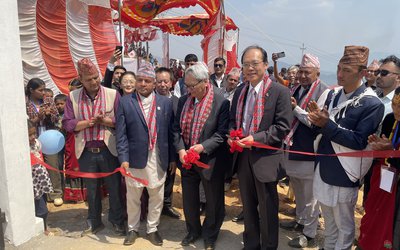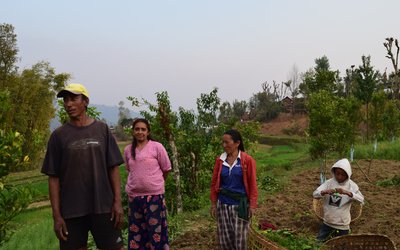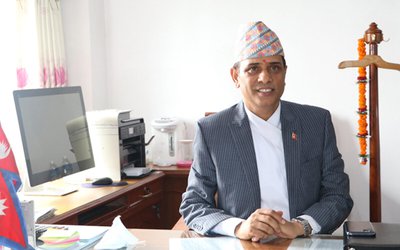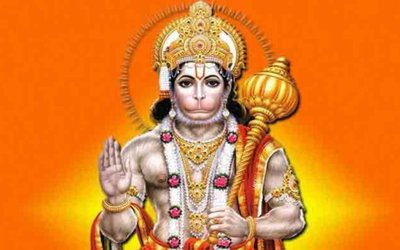If the current political trend of the state is any indication, efforts seem to be underway to hit the ethos and values of a liberal democratic political system. From individual freedom to pluralistic political system, ideals are coming under threat. The state institutions and individuals are, knowingly and unknowingly, promoting state control and state regulatory system.
Finance Minister Bharat Mohan Adhikary tabled a bill in the Legislature-Parliament with the clause that everyone has to disclose the property in front of state authority if necessary. The financial bill will eventually put private banks under the government purview. Private sector has already opposed the bill.
“The government must withdraw certain clauses that go against the individual’s right to property,” said CA member and industrialist Diwakar Golchha. “If the act is passed by the parliament, Nepal’s financial institutions will crumble.”
Some provisions in this act will challenge the liberalization process which has helped private banking system to flourish in Nepal. Nepal Rastra Bank’s order to limit the salary of CEOs and other officials of private banks has already shaken the open and competitive market. The new act will certainly help it to collapse.
Kathmandu University, the country’s only private university, was shut down under the order of two communist student fronts. Student unions have already issued a threat to private boarding schools not to raise the fees.
By announcing work on a new law to contain the International Non-governmental Organizations and Non-governmental Organizations, for making them transparent and accountable, Social Welfare Council and Ministry of Women and Social Welfare have already made clear that they want intervening role in their affairs.
Although some NGOs and INGOs might have done wrong, they have played important role in creating the present level of political and social awareness at grassroots level. Their work to uplift the life of rural poor is unchallengeable. However, there is a campaign against them from all fronts.
Chief Justice Ram Prasad Shrestha and his senior judge Khil Raj Regmi of Supreme Court, which is demanding independence of judiciary, in their recent decision against former minister Chiranjibi Wagle ruled that the son does not have the property right if he lives with his father.
Legal experts say this decision closes prospects for an individual to try individual entrepreneurship. Known for his clean image and respectability, chief justice Ram Prasad Shrestha’s recent decision will have far reaching consequences in the process of liberalization.
The state must act to free the society of corruption by putting the corrupt behind bar but it must follow the due process of law and respect the right to property. For the crime of Chiranjibi Wagle, the court cannot deny the right of his son to earn income.
At a time when chief justice Shrestha has been urging CA members to retain independent of judiciary, he needs to broaden his alliance with the forces which support his cause. Chief Justice Shrestha may have earned more enemy by terming his fellow judges and court corrupt.
“I am proud that we are able to convince UCPN-Maoist to accept some components of liberal democratic values in the new constitution,” said CA member and Nepali Congress leader Ramesh Lekhak.
His indication is that the new constitution may not have the clauses which were there in the constitution of 1990 and previous five constitutions of the past. “New Nepal will have new constitution as the mandate of Janandolan II.”
One of the victims in the proposed new constitution will be the media. The constitution of Kingdom of Nepal 1990 guarantees free press saying that no periodical or press shall be closed or seized nor shall its registration be cancelled merely for printing or publishing any news items, articles, editorials, writing and other reading materials.
In the proposed new constitution, there are some restrictions on the press and media. If the CA passes the proposed constitution as it is, the era of free press comes to an end. “We have already submitted a memorandum to CA chair against this,” said Dharmendra Jha, president of Federation of Nepalese Journalists.
From private banking to the media, from political freedom to the right to property and the right to organize through NGOs, the state is gradually making efforts to control them all. Finally, these efforts will weaken the liberal democratic values.
- TANAHU HYDROPOWER PROEJCT: A Significant Achievement
- Apr 15, 2024
- AMBASSADOR HANAN GODAR: Sharing Pain With A Nepali Family
- Mar 30, 2024
- VISIT OF KfW AND EIB TO NEPAL : Mission Matters
- Mar 25, 2024
- NEPAL BRITAIN SOCIETY: Pratima Pande's Leadership
- Mar 24, 2024
- NEPAL ARMY DAY: Time To Recall Glory
- Mar 15, 2024
















